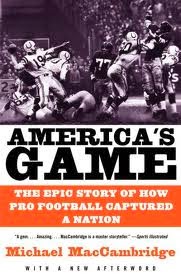 Note: This essay appeared in September, in the first issue of a new British online American football magazine, Gridiron (www.gridiron-magazine.com). It was a sidebar, alongside my column, which has continued through the next two issues, and is worth checking out (issue 2 on concussions, issue 3 on NFL nepotism). I've done listings of baseball books, and an essay on boxing books for Radio 4's Open Book, but this is my first one on football. I've made a few small changes to the published version....
Note: This essay appeared in September, in the first issue of a new British online American football magazine, Gridiron (www.gridiron-magazine.com). It was a sidebar, alongside my column, which has continued through the next two issues, and is worth checking out (issue 2 on concussions, issue 3 on NFL nepotism). I've done listings of baseball books, and an essay on boxing books for Radio 4's Open Book, but this is my first one on football. I've made a few small changes to the published version....
MIKE CARLSON'S FIVE (Or
So) FAVOURITE FOOTBALL BOOKS
Essential reading for anyone interested in the overall history of the
NFL is Michael MacCambridge's America's Game, a comprehensive survey
of the rise of the league to its position of dominance in American
sport. It's particularly well-written, and as far as I can tell, accurate on
the issues of business that are so important behind the scenes;
it is also scrupulously balanced in its portrayals.
In stark contrast, Jeff
Miller's Going Long is a very entertaining oral history of the
American Football League, patterned after Terry Pluto's classic Loose
Balls, which did the same thing for the American Basketball
Association. The players aren't quite as wild as the ABA stars were
in their day, but the owners probably are, and it's eye-opening to
see exactly how disorganised top-flight American sport was in those
days, in contrast to today's corporate world. I often make the
comparison between the pre-Rozelle NFL and the Rugby League in
Britain: this book shows you the truth of that analogy—while the
MacCambridge shows you just how far the NFL has gone since then.
which did the same thing for the American Basketball
Association. The players aren't quite as wild as the ABA stars were
in their day, but the owners probably are, and it's eye-opening to
see exactly how disorganised top-flight American sport was in those
days, in contrast to today's corporate world. I often make the
comparison between the pre-Rozelle NFL and the Rugby League in
Britain: this book shows you the truth of that analogy—while the
MacCambridge shows you just how far the NFL has gone since then.
 which did the same thing for the American Basketball
Association. The players aren't quite as wild as the ABA stars were
in their day, but the owners probably are, and it's eye-opening to
see exactly how disorganised top-flight American sport was in those
days, in contrast to today's corporate world. I often make the
comparison between the pre-Rozelle NFL and the Rugby League in
Britain: this book shows you the truth of that analogy—while the
MacCambridge shows you just how far the NFL has gone since then.
which did the same thing for the American Basketball
Association. The players aren't quite as wild as the ABA stars were
in their day, but the owners probably are, and it's eye-opening to
see exactly how disorganised top-flight American sport was in those
days, in contrast to today's corporate world. I often make the
comparison between the pre-Rozelle NFL and the Rugby League in
Britain: this book shows you the truth of that analogy—while the
MacCambridge shows you just how far the NFL has gone since then.
Breaker Boys by Dave
Fleming comes from the days when you'd be hard-pressed to separate
pro football from early rugby league. It's the story of the 1925
Pottsville Maroons, who were the best team in the fledgling NFL, but
still are not recognised as the champions, because they played an
exhibition game in Philadelphia, territory of the Frankfort Yellow
Jackets, and just as it does today, money talked and the Maroons walked. It's somewhat repetitive in its writing, but it's a great
story.
My favourite football
biography is J. Brent Clark's Third Down And Forever, the story
of Joe Don Looney, an immensely talented running back who lived up to
his surname. It was perhaps his misfortune to come to the NFL in the
Sixties, when his non-conformist nature was both confronted by the
military and could be indulged out of it. Dave Meggyesy's 1970  Out Of
Their League tells a somewhat similar, but much less moving and
tragic story, about the changing times of the Sixties; it was billed
as a football version of Jim Bouton's Ball Four but is much more than
that. Weeb Ewbank called it 'communist hogwash', which is a good enough endorsement for me.
Out Of
Their League tells a somewhat similar, but much less moving and
tragic story, about the changing times of the Sixties; it was billed
as a football version of Jim Bouton's Ball Four but is much more than
that. Weeb Ewbank called it 'communist hogwash', which is a good enough endorsement for me.
 Out Of
Their League tells a somewhat similar, but much less moving and
tragic story, about the changing times of the Sixties; it was billed
as a football version of Jim Bouton's Ball Four but is much more than
that. Weeb Ewbank called it 'communist hogwash', which is a good enough endorsement for me.
Out Of
Their League tells a somewhat similar, but much less moving and
tragic story, about the changing times of the Sixties; it was billed
as a football version of Jim Bouton's Ball Four but is much more than
that. Weeb Ewbank called it 'communist hogwash', which is a good enough endorsement for me.

No comments :
Post a Comment